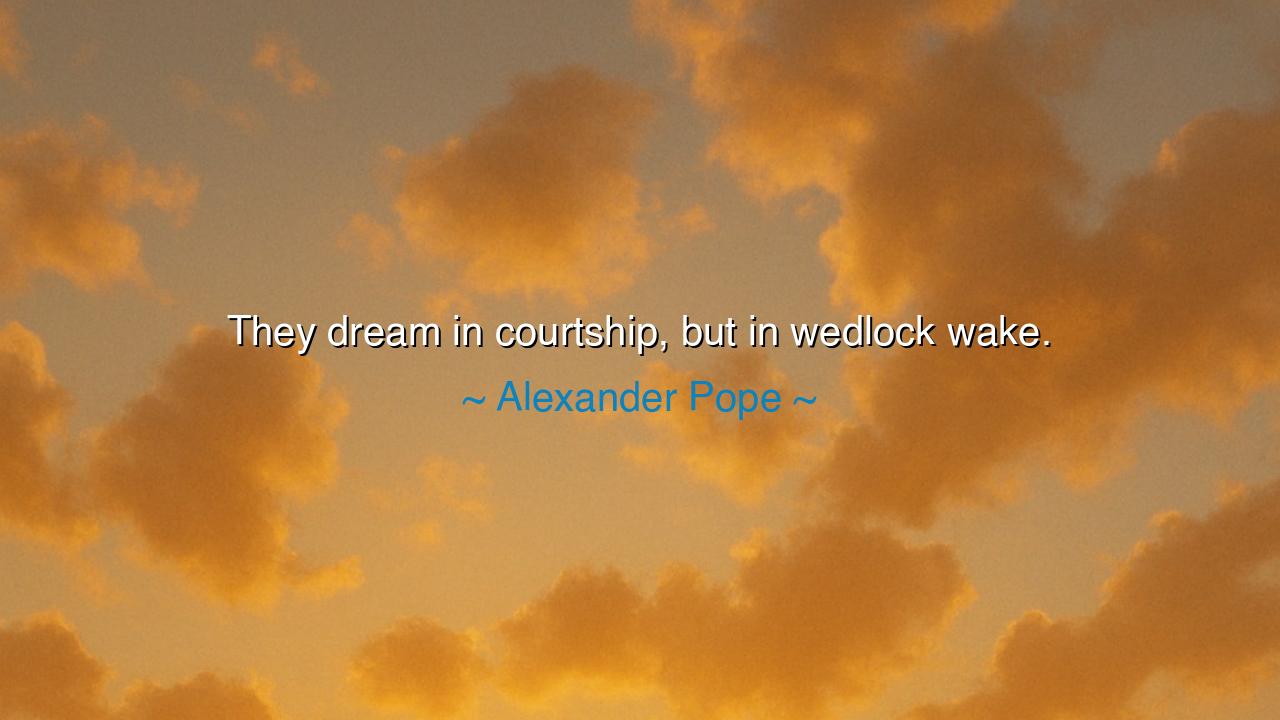
They dream in courtship, but in wedlock wake.






The poet Alexander Pope, keen observer of the follies and vanities of mankind, once declared: “They dream in courtship, but in wedlock wake.” In these words lies a truth as sharp as a blade and as ancient as love itself: that the season of courtship is often filled with visions, illusions, and enchantments, while the state of marriage is the sobering dawn where reality is revealed. Courtship is the dream, a theater of charm where faults are hidden and virtues magnified. But marriage is the waking life, where masks fall away, and the soul must face both the light and the shadow of its chosen partner.
The dream in courtship is the intoxication of hope. Lovers adorn one another with fantasies, imagining perfection where only humanity dwells. Every smile is golden, every word profound, every gesture divine. The beloved is seen not as they are, but as the dreamer longs for them to be. Thus the dream flourishes, carrying hearts into vows with wings of desire. Yet Pope warns us that this dream cannot endure untouched, for the fire of infatuation is but a torch, and marriage demands the steady flame of an enduring lamp.
The waking in wedlock is the confrontation with truth. In the daily grind of life—through burdens, bills, duties, and the small irritations of habit—the illusion is stripped away. The one who was worshiped as flawless is revealed to be human: flawed, weak at times, perhaps difficult. And likewise, the dreamer is revealed to the other. What once was hidden is now exposed, for the closeness of marriage leaves no room for veils. To wake is not necessarily to be disappointed, but to be called into maturity—to replace fantasy with the labor of love, the sacrifice of patience, and the choice to build a life together on truth rather than illusion.
History gives us many echoes of this truth. Consider the marriage of Napoleon Bonaparte and Josephine. In courtship, Napoleon was ablaze with passion, writing letters of fire to his beloved, dreaming of her as the very heart of his existence. Yet in marriage, reality dawned. Josephine was unfaithful, Napoleon was often absent, and what had been a dream soon dissolved into disillusion. Their story, though grand, is but a reflection of Pope’s words: in the glow of courtship they dreamed, but in the light of wedlock they woke.
Yet Pope’s wisdom is not meant only as warning, but as guidance. To wake in wedlock is not the end of love, but the beginning of true love. For the dream is fleeting, but reality, when embraced, can become deeper and stronger. When partners choose to accept one another’s flaws, to labor in patience, to forgive, and to nurture, then waking becomes a gift. They cease to love the illusion and begin to love the person. And in this, their union becomes more steadfast than the fragile dream of courtship ever could.
The deeper meaning is this: do not despise the dream, for it draws lovers together, but do not mistake it for the whole. Courtship enchants the heart, but marriage demands the will. Dreams inspire, but waking builds. To understand this is to enter marriage not with blind fantasy, but with open eyes, ready to work, ready to sacrifice, ready to love not the imagined, but the real.
The lesson for us is clear: cherish the dream of courtship, but prepare for the awakening of wedlock. Do not be dismayed when the veil of illusion falls, for this is the true beginning of love’s labor. Be ready to nurture, to forgive, to grow. For in waking, we find not the end of romance, but the dawn of a love stronger than fantasy, a love built not on dreams but on truth.
Thus, let Pope’s words endure: “They dream in courtship, but in wedlock wake.” For in these words we are reminded that the dream is sweet, but reality, when embraced with courage and tenderness, is greater still. In waking, love is tested, refined, and made eternal.






AAdministratorAdministrator
Welcome, honored guests. Please leave a comment, we will respond soon